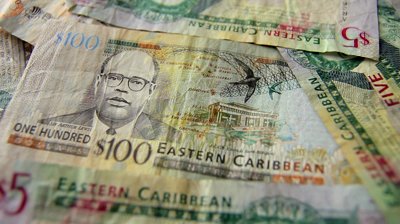Leader of the Opposition Arnhim Eustace has restated his objection to a devaluation of the Eastern Caribbean Dollar, saying the EC$18 million in loss by the Eastern Caribbean Central Bank (ECCB) last fiscal last year is no reason to devalue the currency.
The East Caribbean dollar is the currency of eight of the nine members of the OECS, and has been pegged to the United States dollar since 1976 at the exchange rate of US$1 = EC$2.70.
Governor of the ECCB, Sir K. Dwight Venner said recently that the loss was due to very low returns on Treasury Bills. “We have not overspent our budget, but there has been a drop in revenue of about 30 per cent due to very low returns on Treasury Bills,” Sir Dwight told journalists in Jamaica.
Some analysts have said that it might be time for a devaluation of the EC Dollars, a suggestion that Eustace, an economist, has strongly rejected.
Eustace said that because foreign trade is conducted with US dollars, a devaluation of the EC Dollar would make commodities more expensive.
He, however, said wages will not rise at the same rate to cover such increases.
“So you will be worse off. It might improve the economy being competitive, it might give some improvement in that, but it brings extreme hardship on the consumer,” Eustace said Monday on his weekly radio programme.
“… we have to watch the impact on our economy and I do not support the devaluation of the EC dollar. We have had that system in place for the last 38 years. I think it has worked pretty well and we can’t just jump because we have had some period of difficulty, especially, the 18 million dollar loss of the Central Bank for last year,” said Eustace, a former prime minister and minister of finance.
He noted that the ECCB has reserves of over EC$130 million, some 95 per cent of the EC dollars in circulation.
“There are not many countries in the world that can boast that. So, while it is important to restructure and develop our economies, let us not get carried away because the Central Bank lost 18 million dollars in a particular year,” he said.
“I am sorry that they lost it. I am not particularly pleased that that took place, but I understand some of the circumstances which gave rise to that loss…
“The point is, they loss 18 million dollars. Even given the state of our economies, that is not sufficient justification for any devaluation for the EC dollar,” Eustace said.
The ECCB has said that its reserves can cover imports for eight months, and Eustace noted that other central banks can only cover three months.
“So while I understand we must be careful and the bank must be managed properly, [but] … to my mind, there is no reason at this time to fear a devaluation of the EC dollar. In fact, I will oppose it if that proposal is made,” he said, noting that Sir Dwight also opposes a devaluation of the currency.
He, however, said that it would not be easy to convince the seven independent member states of the Organisation of Eastern Caribbean States (OECS) to devalue the EC dollar.







Mr. Eustace is in living colors here for once i agree with him. this is his lane here when it comes to economics. here he shines.
You are dead wrong on this. The most successful economies in the world have flouting currencies which reflect ther true value of their economies. In terms of actual purchasing power, the $EC dollar is worth no more than $US 0.20 rather than the pegged rate of $US 0.37.
Mr. Eustace is correct C.ben David and you cannot compare our small vulnerable economies with those so call successful economies. We in the ECCB don’t have any natural mineral resources and we don’t have the capacity to produce anything on a large scale. When you devalue your dollar your imports would be more expensive and your export would be cheaper, because we don’t have the capacity to produce on a large scale we would be at a disadvantage. Countries with large economies and large production capacity would benefit more from devaluation, that’s why china don’t want to increase the value of their dollar.
Eustace is right. Since many years I never heard the Governor of the ECCB, Sir K. Dwight Venner, to say, that devaluation is an option, because of the overwhelming negative impact on the local economies. But everybody can be assured, if devaluation comes, for whatever reason, it comes without any prewarning, but not as response to any scaremongering.